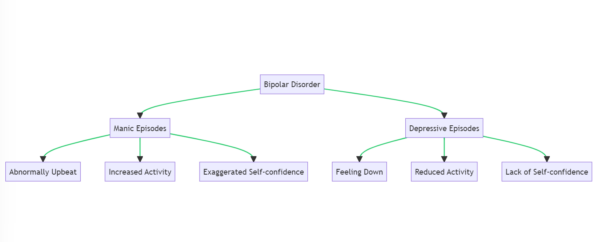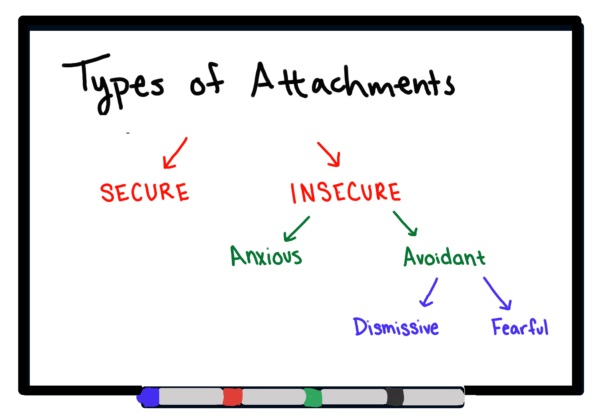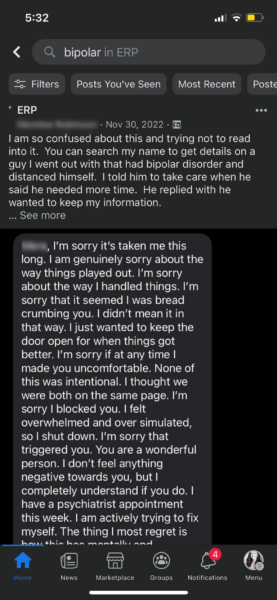Today I’d like to have an in-depth discussion where we break down if bipolar exes will end up missing you.
In short, Just like anyone else, a person with bipolar disorder may miss their ex-partner after a breakup, depending on various factors, such as the length of the relationship, the circumstances of the breakup, their emotional attachment, and their personal coping mechanisms.
I was lucky enough to partner with my wife for this particular article and after hours of research both of us came to realize that this is a very complex topic. Often, it’s not as simple as giving you a “yes/no” or “pass/fail” type answer.
So, in an effort to take a more holistic approach we’ve decided to dive in to the following topics,
- Defining The Two Common Episodes Associated With Bipolar Disorder
- The Most Common Type Of Breakup Bipolar Individuals Will Find Themselves In
- Why The No Contact Rule Is Really Difficult For Someone With Bipolar Disorder
- Answering If Your Bipolar Ex Hates You
- Answering How To Stay Together With A Bipolar Ex
You excited?
I’m excited.
Let’s get to the learning.

What Are Your Chances of Getting Your Ex Boyfriend Back?
Take the quizThe Two Common Episodes Associated With Bipolar Disorder
Before anything let’s talk about what bipolar is and how it shows up in relationships.
Bipolar disorder can coexist with other disorders. However, if we’re talking strictly about bipolar disorder, the symptoms are characterized by extreme shifts in mood, energy levels, and activity levels.
Generally speaking there are two primary types of episodes you’ll see associated with it:
- Manic Episodes
- Depressive Episodes
For your reference:
Manic episodes: During a manic episode, an individual may experience:
- Elevated or irritable mood
- Increased energy and activity levels
- Decreased need for sleep
- Racing thoughts or rapid speech
- Grandiose beliefs or inflated self-esteem
- Impulsive behavior and poor judgment
- Increased goal-directed activity, often with a focus on pleasurable activities
- Risky behavior, such as excessive spending or reckless driving
Depressive episodes: During a depressive episode, an individual may experience:
- Persistent feelings of sadness, hopelessness, or emptiness
- Loss of interest or pleasure in previously enjoyed activities
- Significant changes in appetite and weight (either increased or decreased)
- Insomnia or excessive sleepiness
- Fatigue or loss of energy
- Feelings of guilt or worthlessness
- Difficulty concentrating or making decisions
- Thoughts of death or suicide
The thing that immediately stuck out to me was just how similar the manic/depressive episodes sound to our understanding of the fearful attachment styles.
Do Individuals With Bipolar Disorder Have A Fearful Attachment Style?
If you aren’t familiar there are generally four attachment styles,
- Anxious
- Avoidant
- Secure
- Fearful
Out of those four, three are considered “insecure:”
- Anxious: Terrified of being abandoned
- Avoidant: Terrified of losing independence
- Fearful: Terrified of being abandoned and losing independence
So, the manic/depressive episodes reminds me a lot of the fearful avoidant attachment style.
Where one person jumps back and forth from have anxious triggers to having avoidant ones and this got me thinking, could bipolar exes have fearful attachment styles?
After some research it does appear that there is some evidence to back up my hypothesis.
According to NeuRa:
Moderate to high quality evidence finds a large effect of more insecure attachment styles in people with bipolar disorder compared to controls. This effect was similar to that seen in people with depression or schizophrenia. It was also similar across all three disorders for anxious attachment style. However, for avoidant attachment style, it was small for schizophrenia, medium-sized for bipolar disorder, and large for depression.
At least on the anxious side of things.

What Are Your Chances of Getting Your Ex Boyfriend Back?
Take the quizAccording to that research it appears that bipolar people are highly prone to having anxious attachment styles and “medium sized prone” for having avoidant styles.
So, I can’t definitively say they have a fearful style BUT the evidence is kind of there to support the hypothesis.
And that leads me to an even more fascinating question.
What Is The Most Common Type Of Breakup Bipolar Individuals Will Find Themselves In
I’ve done a ton of research on this topic and reviewed many case studies and most people with bipolar disorder will be on and off in their relationships. This is because they waver between mania and depression.
You will notice your ex may say or do things that they regret later and it’s likely you will get an apology letter.
Here’s an actual example of that in real time taken from our community,
When the mania turns into depression that’s when your ex will start to miss you and regret the breakup.
A lot of times a breakup with someone with bipolar will be impulsive. They will chase the mania because it feels euphoric so they will get a new car, new house, new job or new relationship to feel that mania but usually they will have buyers remorse when the mania wears off.
So yes they absolutely miss you and it’ll usually happen during that manic episode.
There’s a great lecture done by Dr. Patrick Mckeon on YouTube where he talks a lot about this concept. I highly recommend you check it out.
The No Contact Rule With Bipolar Disorder
So, we are famous for our “active” no contact.
Here’s our quick definition:
The no contact rule refers to a period of time where you cut off all conceivable communication with an ex after a breakup. The intent of this tactic should NOT be used to make your ex miss you but instead should be used to rebuild your own life so that you outgrow your ex. By doing this, the no contact rule can have the added benefit of making an ex miss you
But how does bipolar disorder effect this?
Well, generally speaking the no contact is very hard for someone to complete with bipolar disorder.
Once again, here’s a prime example of that in action.
In this case our client who has bipolar disorder says,
So, I’m bipolar and every minute that passes without contact is like torture. What do you do to make it easier? Thank you.
I think it’s especially torturous because when you are left alone you are more likely to swing to that depressive episode and pretty soon it feels inescapable.
Honestly I don’t have a ton of data about the bipolar exes experience during no contact but I’d be willing to wager it’s very similar. They are going to struggle.
But most of you are here because your ex is the bipolar one and sometimes during a breakup it can literally feel like they hate you.

What Are Your Chances of Getting Your Ex Boyfriend Back?
Take the quizDoes My Bipolar Ex Hate Me?
Being in a relationship with someone who has bipolar disorder can be a challenging experience, particularly due to the significant mood swings that are a hallmark of this condition. These mood swings can range from periods of extreme happiness or mania to severe depression, often occurring within a span of just a few weeks.
During these rapid shifts in mood, it may seem as though the individual with bipolar disorder harbors negative feelings towards you. However, it’s crucial to understand that these perceived sentiments are not personal but rather a manifestation of their mental health condition.
Bipolar disorder is often a result of a combination of factors, including chemical imbalances in the brain and significant childhood trauma. These factors contribute to the mood swings and behaviors associated with the condition.
For instance, during depressive episodes, an individual with bipolar disorder may exhibit behaviors such as staying in bed all day. They may feel a sense of worthlessness and perceive themselves as unlovable, leading them to avoid social interactions.
On the other hand, during manic episodes, they may also avoid you, but for different reasons. The heightened energy and activity levels can make them fearful of revealing their condition, leading to avoidance behaviors. They may worry that you’ll notice something is amiss, further exacerbating their anxiety.
Understanding these behaviors and the underlying causes can help in navigating relationships with individuals who have bipolar disorder. It’s essential to approach these situations with empathy and patience, recognizing that their actions are not a reflection of their feelings towards you, but rather a symptom of their condition.
How Can I Stay Together With An Ex Who Has Bipolar Disorder?
In my opinion there are seven key strategies we are going to want to look at:
- Implement Dialectical Behavior Therapy (DBT)
- Establish A Healthy Routine
- Prioritize Sleep
- Practice Mindfulness
- Validate Their Feelings
- Avoid Alcohol
- Recognize Personal Signs Of Mania
Let’s talk a bit more in-depth now.
Strategy #1: Dialectical Behavior Therapy (DBT):
DBT is a type of therapy that can be incredibly beneficial for individuals with bipolar disorder. It goes beyond medication, addressing emotional and psychological challenges.
DBT teaches four key skills:
- Mindfulness: This involves being fully present and accepting experiences without judgment. It helps individuals become aware of their thoughts, emotions, and sensations, reducing reactivity and promoting emotional regulation.
- Distress Tolerance: This skill helps individuals manage distressing situations without resorting to impulsive or self-destructive behaviors. Techniques include self-soothing, distraction, and finding ways to tolerate discomfort.
- Emotional Regulation: This focuses on understanding and managing emotions effectively. It involves identifying and labeling emotions, recognizing emotional triggers, and developing strategies to modulate emotional responses.
- Interpersonal Effectiveness: This skill improves communication, assertiveness, and relationship-building. It includes setting boundaries, expressing needs effectively, and resolving conflicts.
Once again, I really recommend you watch that discussion Dr. Mckeon did on YouTube. He talks a lot about this in there:
Let’s move on to the next strategy.
Strategy #2: Establishing a Healthy Routine:
Routines provide predictability, which can be comforting for someone with bipolar disorder.
Seeing you regularly, such as every morning, can provide a sense of stability and reduce anxiety that might trigger an episode.
Strategy #3: Prioritizing Sleep:
Sleep is crucial for individuals with bipolar disorder.
As Dr. Patrick McKeon notes,
“2-3 nights without sleep can trigger a manic episode.”
Encouraging good sleep hygiene can help prevent these episodes.
Strategy #4: Practicing Mindfulness:
Individuals with bipolar disorder often struggle with repetitive, negative thoughts about their past.
Mindfulness can help them focus on the present, reducing the impact of these thoughts on their current mood.
Strategy #5: Validating Their Feelings:
Many people with bipolar disorder had their feelings dismissed in childhood.
Validating their emotions can help them feel understood and supported.

What Are Your Chances of Getting Your Ex Boyfriend Back?
Take the quizStrategy #6: Avoiding Alcohol:
Alcohol can trigger bipolar episodes and reduce the effectiveness of medication. If you avoid drinking, your ex is more likely to do the same, reducing the risk of episodes.
Strategy #7: Recognizing Personal Signs of Mania:
Early recognition of manic episodes can prevent them from impacting relationships or work. For example, my wife told the story that someone she knew growing up who had bipolar disorder was being triggered when she saw that person walking outside at a fast pace without a shirt was a sign of impending mania.
Every bipolar person has their quirks or warning signs.
By implementing these strategies, you can maintain a healthier relationship with an ex who has bipolar disorder.
It’s important to remember that everyone’s experience with bipolar disorder is unique, and what works for one person may not work for another.
Always approach the situation with empathy, patience, and understanding.




Tamella White
June 29, 2025 at 2:18 am
I’ve dated a guy for 4 years and he’s left me three times it’s always the same cycle. He comes suddenly out of nowhere I’m irresistible and then 6 months later 8 months at the most he disappears again without a word.. I loved him dearly, but in the healing process I published a book called A Summer Love by Tamella White. In the book I use a sailor that gets lost at sea to describe the emotional turmoil. I hope my book helps people understand the heartache that so many of us have experienced and our burning desire to help them heal.
Lucy
May 21, 2025 at 9:47 am
A close friend of mine has bipolar and there have been years (not weeks) where she is completely well and living a normal live between episodes. It is very hard to generalize this disorder. One of her exes used bipolar against her to blame things on her, even though she didn’t experience any episodes during their relationship. Both partners need to be emotionally mature, educate themselves about bipolar and realize that (when treated properly) it is a manageable disorder, not the persons’ entire character (“crazy”).
Jay
July 30, 2024 at 2:02 am
I have been in a relationship with a Bipolar woman for 10 years. The struggle is real. I have read books, watched videos and spoke to other Healthcare Professionals, since I am also a HCP. She will break up and go silent – even blocking my number. Her actions will bring out one of my reactions. I have learned, if you’re mad, don’t show it and If you criticize, it won’t be forgotten. I feel so bad for her because I can’t imagine what goes on in her head. When she is sweet, she is the greatest and you can only guess what it’s like when she is mad. I have heard, “I hate you” as much as I have heard “I love you”. During a rough patch, I sparked up a friendly relationship (no sex, kissing or touching) just someone to talk to while she was ignoring me. She found out about this nurse. Not good. I haven’t heard the end of it. However, weeks later, she is worried I will leave her as I have lost weight and gotten back in the gym. I love this woman with everything but, from experience, if you get into a relationship with a Bipolar person, you better do your homework.